
| Publisher: | Ballantine | |
| Genre: | Women, Sagas, Literary, Fiction | |
| ISBN: | 9781524798628 | |
| Pub Date: | March 2019 | |
| Price: | $27 |
| Fiction |
by Taylor Jenkins Reid
Taylor Jenkins Reid's Daisy Jones & The Six opens by noting this is the only official account of the titular band's history and dramatic breakup mid-tour in 1979, an event that has remained a mystery for 40 years. What follows is so realistic and rich in details, readers might forget the band is fictional.
At the start of her career in the early 1970s, Daisy, a wild child and naturally gifted singer, wants to record her own songs, not the pop ditties her reps push on her. Another artist on her label, Billy Dunne, frontman of a rock band called The Six, has written a song his producer says should be a duet with a female vocalist. Like Daisy Jones. She and Billy begrudgingly agree to work together, resulting in combustible chemistry and a hit that begs for more collaboration between the two. When Daisy is invited to join the band, she's a grenade thrown into the mix, and sparks fly, both good and bad.
Reid tells the story through excerpts from interviews with band members and the people caught up in their vortex--she's trimmed all the fat and included only the juiciest morsels. Daisy Jones & The Six is more than sex, drugs and rock 'n' roll, though there's plenty of that. It cracks open the creative process and shows how much it costs sometimes to make art that resonates. The songs are described with such ache and raw emotion that readers will wish the band's music were real. Each character springs to life; they're inspiring and tough and messy and heartbreaking. Rock stars--they're just like us. --Elyse Dinh-McCrillis, blogger at Pop Culture Nerd
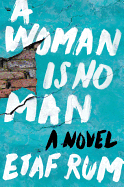
| Publisher: | Harper | |
| Genre: | Women, Cultural Heritage, Family Life, General, Fiction | |
| ISBN: | 9780062699763 | |
| Pub Date: | March 2019 | |
| Price: | $26.99 |
| Fiction |
by Etaf Rum
In this heartrending debut novel that will likely be a book club favorite, Palestinian American writer Etaf Rum explores the cloistered yet perilous lives of the women in a Palestinian immigrant family in Brooklyn, N.Y.
In 1990, 17-year-old Isra leaves Palestine for Brooklyn with Adam, the husband her parents chose for her. After spending most of her life in her family's kitchen, the sight of New York astonishes Isra. Adam and his overbearing mother, Fareeda, expect her to exemplify the dutiful Arab wife, keeping to the house to cook, clean and raise sons. Meek Isra silently chafes against their expectations while her teenage sister-in-law, Sarah, rebels against Fareeda's attempts to marry her off. Isra bears only daughters, further ratcheting up the household tension.
Eighteen years later, Isra and Adam are dead. Their eldest daughter, Deya, longs to go to college, but Fareeda insists she marry. In the older woman's mind, Deya must keep to the culture and accept that men, not women, have choices. Deya longs to please her family, until she reads an unfinished letter from Isra that makes her question everything she believed about her mother.
In an open letter to readers, Rum has said that while writing this story, she fought her own apprehension about breaking the code of silence that surrounds the Palestinian immigrant community, as well as her fear of adding to stereotypes against it. Luckily for readers, she chose authenticity over caution. Crafted with thoughtfulness and empathy, A Woman Is No Man celebrates resilience and the courage required to speak out against an unjust way of life. --Jaclyn Fulwood, blogger at Infinite Reads
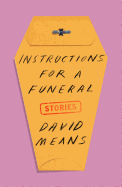
| Publisher: | Farrar, Straus and Giroux | |
| Genre: | Short Stories (single author), Literary, Fiction | |
| ISBN: | 9780374279813 | |
| Pub Date: | March 2019 | |
| Price: | $25 |
| Fiction |
by David Means
It's impossible to isolate a single dominant theme in Instructions for a Funeral, the fifth story collection by David Means (Assorted Fire Events). The title selection, however, is as good as any for revealing the distinctive pleasures of his short fiction. In it, the narrator, William Kenner, a real estate developer, in the guise of a meticulously detailed and wickedly funny letter to his lawyer, reveals how his friend Philpot and Sullivan, a New York mobster, swindled him in a real estate deal. Featuring the harrowing description of a mass shooting, two dramatic scenes of rescue and a chilling encounter between Kenner and Sullivan, and the final sentence, "Everything, right now, is safe and cozy," it's a masterly literary juggling act.
Not all of Means's stories are so dramatic. "The Chair" is a stream-of-consciousness account of a stay-at-home father's musings as his son cavorts on a stone wall above the Hudson River, a setting for several other stories. Anyone who's ever wrestled with the balance between love and discipline will appreciate the narrator's ambivalence as he futilely warns a five-year-old boy of the consequences of his daredevil antics. Transgression of a different type is the subject of "The Mighty Shannon," where the protagonist of "The Chair" and his wife, Sharon, a Manhattan lawyer, find themselves in a couples therapist's office confronting the aftermath of their mutual affairs.
Instructions for a Funeral is like the proverbial box of chocolates. Not every story will suit every reader's taste, but there are ample treats here guaranteed to surprise and delight anyone. --Harvey Freedenberg, freelance reviewer
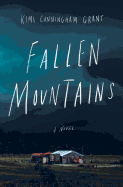
| Publisher: | Amberjack Publishing | |
| Genre: | Small Town & Rural, Crime, Literary, Fiction | |
| ISBN: | 9781948705189 | |
| Pub Date: | March 2019 | |
| Price: | $14.99 |
| Mystery & Thriller |
by Kimi Cunningham Grant
Sheriff John "Red" Redifer is itching to retire from the Fallen Mountains Police Department. But before he can submit his letter of resignation, a woman shows up at the station to report that her boyfriend, Transom Shultz, has been missing for five days.
Chapters offering Red's perspective as he tries to account for Transom's disappearance alternate with chapters from the perspectives of locals who, like Red, know Transom all too well. There's Chase Hardy, who was initially grateful to his longtime friend for buying the Hardy farm after his grandparents died--Chase continues to work and live on the land--but he resents that Transom sold off the property's mineral rights. There's Laney, whose sexual history with Transom has spilled into the too-recent past; she fears that he won't keep the secret from Chase, with whom she has fallen in love. And there's Laney's cousin Possum, who as a teenager tried to kill his stepfather. He also has reason to want to kill Transom, as only Red, still burdened by a hard decision he made years earlier, is aware.
The fracking angle makes Fallen Mountains a topical novel, but its primary concern--whether it's ever conscionable to put family before civic duty--belongs to any era. Kimi Cunningham Grant, a prize-winning poet and the author of the memoir Silver Like Dust, uses marvelous economy to play out this small-town thriller, which is ingeniously plotted to the end; mystery lovers accustomed to a few final pages of languid wrap-up can forget it. --Nell Beram, author and freelance writer
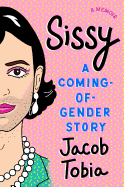
| Publisher: | Putnam | |
| Genre: | Biography & Autobiography, Personal Memoirs, Social Activists, LGBT | |
| ISBN: | 9780735218826 | |
| Pub Date: | March 2019 | |
| Price: | $26 |
| Biography & Memoir |
by Jacob Tobia
Activist and writer Jacob Tobia is 27, genderqueer and here to blow up the gender binary with Sissy: A Coming-of-Gender Story. It's a funny, heartbreaking and earnest account of Tobia's early and young adult life, as well as a smart and accessible entry point for readers interested in learning more about transgender experiences.
Tobia, who uses they/their/them pronouns, grew up in a relatively conservative and conventional family in Raleigh, N.C. Assigned male at birth, Tobia was a sensitive, creative and "glitter-obsessed" child who found a kind of freedom with their friend Katie, whose mother let them play dress-up and raid her makeup collection with impunity. Relentlessly bullied for their femininity, Tobia learned to suppress it--and, as a result, became profoundly depressed and even suicidal, which they note is not unusual for a trans child.
While Tobia is candid about difficult experiences like these, Sissy's tone is more entertaining and playful than it is bleak. Aided by plentiful, chatty footnotes, Tobia charts the ongoing evolution of their genderqueer identity with open-hearted vulnerability and a razor-sharp wit. If Sissy has a guiding ethos, it is truth-telling. Tobia's story is not representative of some universal transgender experience, but a testament to, and an affirmation of, the diversity of truths that queer stories contain.
While everyone has something to learn from Sissy, readers new to stories and identities like Tobia's will find this memoir an especially welcoming introduction to the quite simple but still revolutionary notion that there are more than two genders. --Hannah Calkins, writer and editor in Washington, D.C.
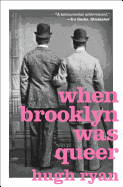
| Publisher: | St. Martin's Press | |
| Genre: | Gay Studies, State & Local - Middle Atlantic (DC, DE, MD, NJ, NY, PA), United States, 20th Century, History, Social Science, LGBT Studies | |
| ISBN: | 9781250169914 | |
| Pub Date: | March 2019 | |
| Price: | $29.99 |
| Starred | History |
by Hugh Ryan
The idea of Brooklyn, N.Y., having a significant queer history surprises many present residents. But Hugh Ryan, founder of the Pop-Up Museum of Queer History, cracks open what looks like a blank slate and finds richness there, beginning with the 1855 publication of Walt Whitman's Leaves of Grass. Whitman represents an early association with Brooklyn and with white men who have sex with men (people of color and queer women did not appear in the historical record yet). From here, Ryan covers periods of growing visibility through turn-of-the-century newspapers and the theater; the rise in criminalization and persecution of queers in the 1910s; and the quick expansion of both the queer scene and Brooklyn at large in the 1920s.
The Depression, the end of Prohibition and the Hays movie code brought new strictures on a vibrant world of bars and cruising venues. Mobilization for World War II offered great opportunities for queer people, as men joined the armed forces and women went to work in factories and shipyards like the Brooklyn Navy Yard. Following the war, a societal move toward conservatism, the suburbanization of New York City and the shutdown of Brooklyn's waterfront lead to what Ryan calls "the great erasure" of queer community and history.
Painstaking research and attention to detail highlight the richness and mystery of stories that have been largely hidden until now. Moreover, When Brooklyn Was Queer achieves everything one could want in a history, with its easy-reading narrative, fascinating small events within significant larger ones and personal interest. --Julia Kastner, librarian and blogger at pagesofjulia
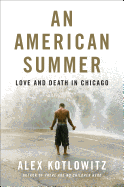
| Publisher: | Nan A. Talese | |
| Genre: | True Crime, Discrimination & Racism, Public Policy, General, Violence in Society, Social Science, Political Science | |
| ISBN: | 9780385538800 | |
| Pub Date: | March 2019 | |
| Price: | $27.95 |
| Social Science |
by Alex Kotlowitz
Chicago has had a reputation for violence and crime since the rise of the mob in the early 20th century. But stories of gangs and menaces to society are rarely illuminating, drawing the people of Chicago in caricature instead of revealing their humanity.
Thankfully, there are writers like Alex Kotlowitz (There Are No Children Here), who take up the mantle of telling real stories of the city. An American Summer is a collection of vignettes all taking place during the summer of 2013. Its chapters drop in on people living and working in Chicago, including high school students, former gang leaders and U.S. congressmen. As Kotlowitz puts it, the book is a collection of "dispatches, sketches of those left standing, of those emerging from the rubble, of those trying to make sense of what they've left behind." Nearly every one of his subjects is either the victim or perpetrator of violence. Even some of the book's most high-profile figures, such as Congressman Bobby Rush, have been personally affected by the city's violence. (Rush's son was shot and killed in 1999.)
Kotlowitz has an uncanny rapport with all his subjects, sitting down with them for months or years, learning about their struggles from friends and family and creating a compelling, incredibly readable depiction of their lives. There is pain, death and deep sadness throughout these pages, but also love, forgiveness and new beginnings. Kotlowitz presents life as it is for those living in Chicago: the chaos, tragedy and connections that give life meaning and hope. --Noah Cruickshank, director of communications, Forefront, Chicago, Ill.
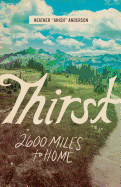
| Publisher: | Mountaineers Books | |
| Genre: | Biography & Autobiography, Personal Memoirs | |
| ISBN: | 9781680512366 | |
| Pub Date: | January 2019 | |
| Price: | $17.95 |
| Starred | Travel Literature |
by Heather Anderson
Heather Anderson, who is known on the trail as "Anish," is one of the fastest long-distance hikers in the United States, setting women's speed records and occasionally smashing men's on some of the country's longest, most grueling trails. She's also completed other famed hiking challenges, and she is an accomplished mountaineer and ultramarathon runner as well.
Despite her achievements and obvious ability, Anderson is a somewhat unlikely elite athlete. She began hiking as an out-of-shape college student with no real outdoors experience but a deep spiritual pull to the wilderness. Today, even as her profile rises, she refuses sponsorships and other forms of support, and has eschewed convention to live most of her life among mountains and on trails.
Thirst: 2600 Miles to Home is Anderson's account of the 60 days, 17 hours and 12 minutes she spent hiking the entire Pacific Crest Trail in 2013, breaking the previous speed record set by hiking legend Scott Williamson. It is a slim, fast read, and yet the experience of reading it feels a bit like a low-stakes simulation of Anderson's hike: grueling, meditative, exhilarating and exhausting by turns.
"Each day on the trail I felt myself slipping a little farther into a primal state, where all that mattered... was surviving the day," she writes. "And yet, I still had no idea what drove me, or where that drive came from."
Filled with ruminative self-reflection, soaring natural descriptions and delightful accounts of the gracious, life-sustaining "trail magic" of hiking culture, Thirst is a testament to human endurance, inspiring to hikers and non-hikers alike. --Hannah Calkins, writer and editor in Washington, D.C.
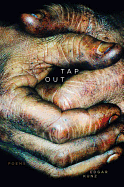
| Publisher: | Mariner | |
| Genre: | Biography & Autobiography, Family & Relationships, American, Personal Memoirs, Family, General, Poetry, Subjects & Themes, Dysfunctional Families, Places | |
| ISBN: | 9781328518125 | |
| Pub Date: | March 2019 | |
| Price: | $14.99 |
| Poetry |
by Edgar Kunz
In a poem about waiting on line for food stamps, the narrator feels acute embarrassment, but then confides, "No one was looking. Nobody looks." Much of Tap Out by Edgar Kunz conveys this sentiment. Here is misery and desperation and no one is paying meaningful attention. And yet, Kunz later admits a cruel duality: "...drawing crowds of tourists/ who posed alone or with/ their blonde polo'd families a safe/ distance from their wilderness." The narrator feels both willfully ignored and scrutinized by rubberneckers. Readers are permitted to keep a safe distance from Kunz's "wilderness," a world of working-class poor, marred by suicide, death, drugs and violence. It is a world steeped in machismo or toxic masculinity. These poems have a pervasive physicality that is both rewarding and horrifying.
Kunz plays on these contrasts most effectively with the narrator's ambivalent relationship with his father, a dominating presence in the collection. In "Close": "He's still beautiful, my father. Fluid./ Powerful. His bare forearms corded/ with muscle, bristling in the cold. Yes,/ he's drunk." Yet, in "Natick," the speaker is scarred when his father "said I had piano hands,/ and I was ashamed, and hid them in the pockets of my coat."
Arresting imagery, unexpected detail, brilliant use of tensions, a flowing rhythm and overall accessibility make this a collection to be read and re-read. --Evan M. Anderson, collection development librarian, Kirkendall Public Library, Ankeny, Iowa
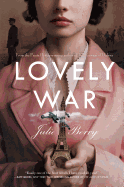
| Publisher: | Viking | |
| Genre: | War & Military, Greek & Roman, Romance, Legends, Myths, Fables, Young Adult Fiction, Historical | |
| ISBN: | 9780451469939 | |
| Pub Date: | March 2019 | |
| Price: | $18.99 |
| Starred | Children's & Young Adult |
by Julie Berry
Words like "epic," "sweeping" and "romantic" might have been designed with Julie Berry's Lovely War in mind. In this love story "for the ages," parallel story lines depict both a mock trial between Greek gods and the love stories of two intertwined pairs of mortals.
In the middle of World War II, Hephaestus, Greek god of fires, lays a trap for his wife, Aphrodite, goddess of love, and her not-so-secret lover, Ares, god of war. Rather than submitting to the "spectacle of the entire pantheon of immortals howling and cackling at her mortification" on Olympus, Aphrodite negotiates a private trial. Aphrodite--who believes that, though she is the "source of love," no one can "ever truly" love her--tells "judge, jury, and executioner" Hephaestus what "real love looks like," as illustrated by imperfect mortals. Aphrodite's narrative then shifts back and forth between the world wars.
In November of 1917, soldier James meets pianist Hazel as she plays music for a church dance in her London neighborhood. Their sweet budding romance is cut short when James is summoned early to the Western Front. Meanwhile, another love story is percolating. Colette, a white Belgian singer who lost her entire family to a brutal German slaughter meets (and falls for) Aubrey, a black musician and New Yorker whose all-black regiment performs for other soldiers. As Aphrodite and her fellow immortals debate the role of love in war, and war in love, the four young people enact the real-life courtroom drama--too often, literally.
In Lovely War, Printz-honoree Berry (The Passion of Dolssa; All the Truth That's in Me) weaves factual historical events and backdrops into an exquisitely crafted, funny and, yes, epic, novel. --Emilie Coulter, freelance writer and editor
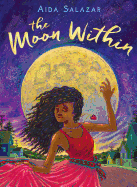
| Publisher: | Arthur A. Levine/Scholastic | |
| Genre: | Friendship, People & Places, Adolescence & Coming of Age, Social Themes, United States - Hispanic & Latino, Stories in Verse (see also Poetry), Juvenile Fiction, LGBT | |
| ISBN: | 9781338283372 | |
| Pub Date: | February 2019 | |
| Price: | $17.99 |
| Children's & Young Adult |
by Aida Salazar
Essayist, short-story writer and first-time children's novelist Aida Salazar's The Moon Within is a contemporary tale told in first-person verse about a girl reaching deep within herself for understanding.
Eleven-year-old Celi is a good student, a dancer and a drummer. Her Xicana (a girl or woman "in the US with Mexican indigenous origins") mother, Mima, is an herbalist; her black Puerto Rican father a drummer and music teacher. She and her fellow Oakland, Calif., tweens are beginning to learn about their new feelings, changing bodies and expressions of sexuality and gender. Her best friend, Magda, for example, now requests that others use the pronouns he/him and call him Marco or Mar. His eloquent father explains this new identity by calling Mar xochihuah, a person "who danced between or to other energies than what they were assigned at birth." Celi struggles with her identity as a young woman, scared of the moon ceremony her mother, searching for tradition, wants to hold to celebrate her first period. She also yearns to enjoy her first girl-boy relationship with Iván, who, like her, is "Black-xican--Black and Mexican mixed"--but he and other kids make fun of her genderfluid friend. Celi "like" likes Iván, but wants to be loyal to Mar.
Salazar's language is frank and rich, using occasional Spanish or Mexica/Nahuatl words, to express each tween's individual thoughts and emotions during the wholly common experience of puberty. As Salazar explains in her author's note, The Moon Within is also working to resurrect from the Mexica past the traditional connection between women and the natural world. Readers are sure to respond to Celi (and Salazar), as they think about their own bodies, feelings and relationships. --Melinda Greenblatt, freelance book reviewer